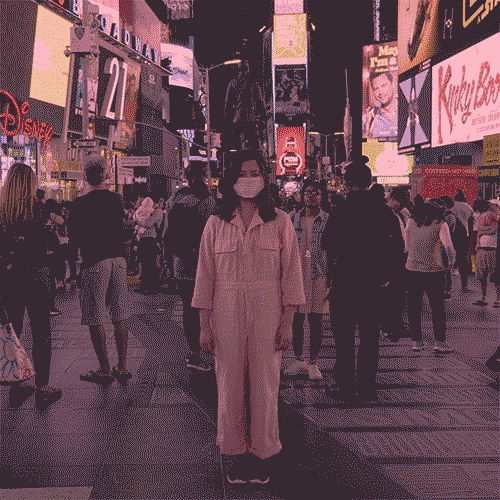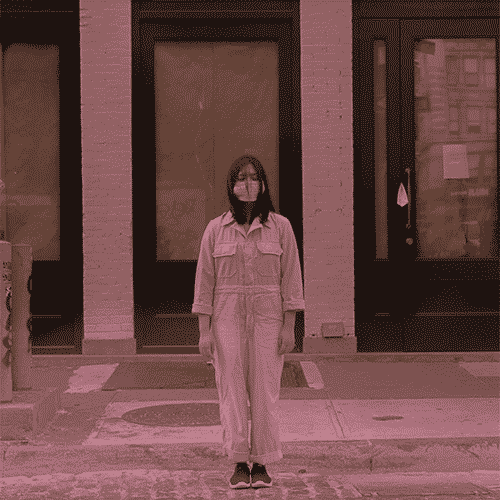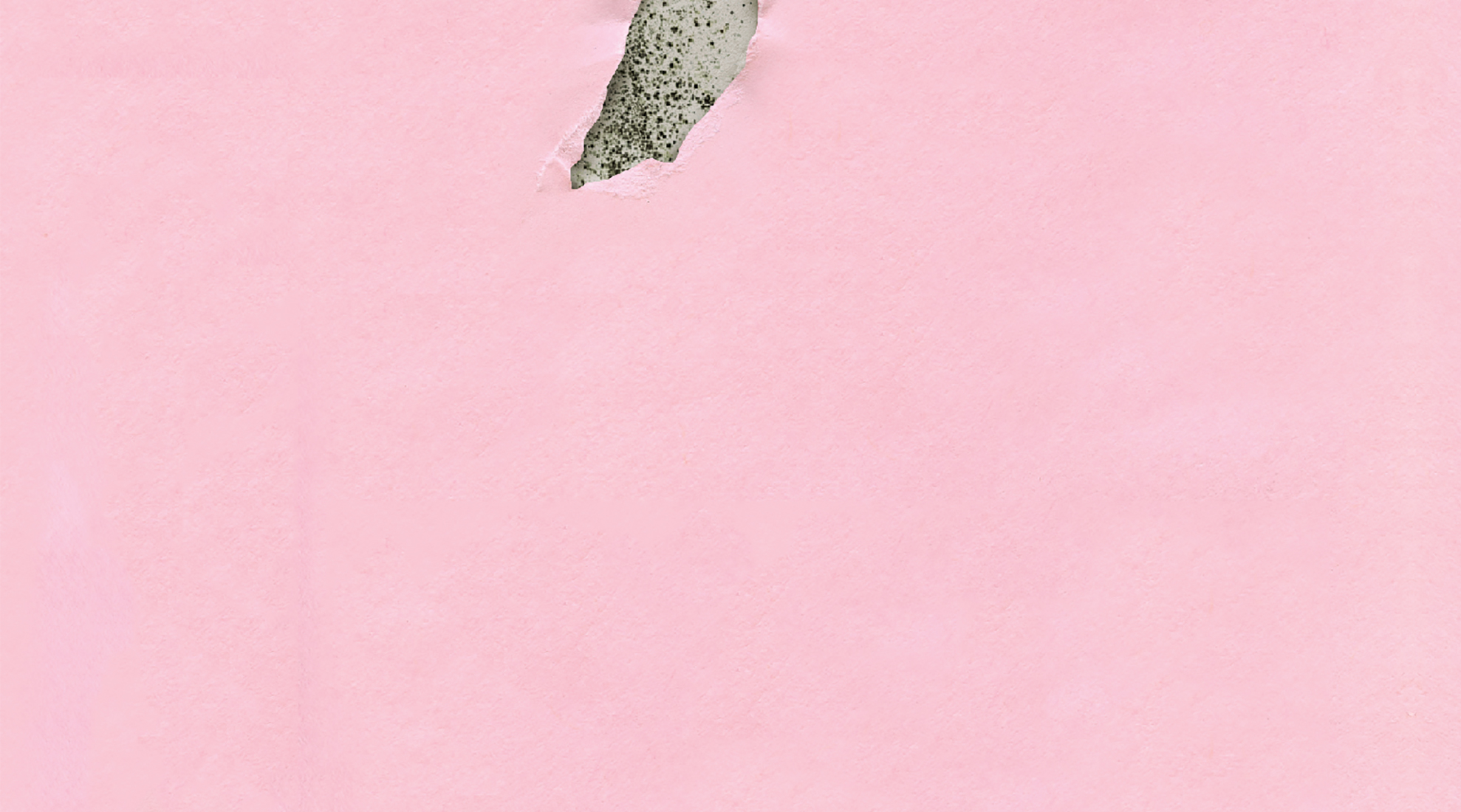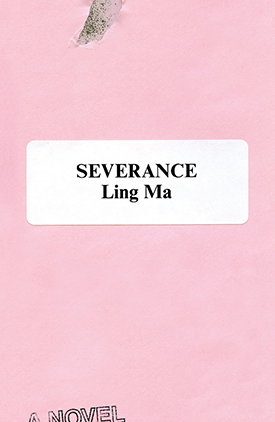In Ling Ma’s wryly funny, apocalyptic satire, Severance, Candace Chen spends her days self-sequestered in a Manhattan office tower, devoted to routine. She goes to work, rides the subway, watches movies in a Greenpoint basement with her boyfriend. So she barely notices when a plague of biblical proportions sweeps New York. Then Shen Fever spreads. Families flee. Companies cease operations. The subways screech to a halt. Soon entirely alone, still unfevered, she photographs the eerie, abandoned city. Maybe it’s the end of the world, but not for Candace, a millennial, first-generation American, and office drone meandering her way into adulthood.
The End begins before you are ever aware of it. It passes as ordinary. I had gone over to my boyfriend’s place in Greenpoint directly after work. I liked to stay over on hot summer nights because the basement was cool and damp at night. We made dinner, veggie stir-fry with rice. We had showered and watched a movie projected on his wall.
The screening was Manhattan, which I’d never seen before, and even though I found the May–December romance between Mariel Hemingway and Woody Allen kind of creepy, I loved all the opening shots of New York set to the Gershwin soundtrack, and I loved the scene in which Woody Allen and Diane Keaton get caught in the rain in Central Park, and they seek shelter in the Museum of Natural History, wet and cocooned in the cavern darkness of the planetary display. Just looking at New York on the screen, the city was made new for me again, and I saw it as I once did in high school: romantic, shabby, not totally gentrified, full of promise. It made me wistful for the illusion of New York more than for its actuality, after having lived there for five years. And as the movie ended and we turned off the lights and lay down side by side on his mattress, I was thinking about how New York is possibly the only place in which most people have already lived, in some sense, in the public imagination, before they ever arrive.

I was saying some of this to him, the shapeless mass lying next to me in the dark, when he interrupted and said, Listen to me. Look at me. I have something to tell you.
His name was Jonathan and he liked to party. Not really. His name was Jonathan and he was high-rolling. He owned a laptop, a coffee maker, a movie projector; everything else went to rent. He ate air and dust. We had been together for almost five years, about as long as I’d been at my job. Jonathan didn’t work in the nine-to-five sense. He did odd freelance gigs here and there so that he could spend most of his time writing. Divested of most obligations, he lived cheaply, held jobs when he could find them. Once, for a secret Wall Street club, he was hired to slap middle-aged businessmen for a living. I used to clasp his face between my palms, his expression wrought with worry, with unassuaged anxiety.
Okay, I said. What is it?
He took out his retainer, didn’t place it in the mug on the floor but held it there in his hand. It was going to be a short conversation. He said, I’m leaving New York.
What, you didn’t like the movie?
No, I’m serious. Be serious for once.
I’m always serious, I deadpanned. So, when are you leaving?
He paused. In another month. Thom is sailing up to this—
I sat up, tried to look at him, but my eyes hadn’t adjusted. Wait, what are you saying?
I’m saying I’m leaving New York.
No, what you’re saying is, you’re breaking up with me.
That’s not— He looked at me. Okay. I’m breaking up with you.
Lead with that.
No, it’s not you, he said, grabbing my hand. It’s this place, this city and what it turns a person into.
It’s not you.
Okay.
No, it’s not you, he said, grabbing my hand. It’s this place, this city and what it turns a person into. We talked about this.
In the past year, Jonathan had become increasingly disillusioned with living in New York. Something along the lines of: the city, New York fucking City, tedious and boring, its charms as illusory as its facade of authenticity. Its lines were too long. Everything was a status symbol and everything cost too much. There were so many on-trend consumers, standing in lines for blocks to experience a fad dessert, gimmicky art exhibits, a new retail concept store. We were all making such uninspired lifestyle choices. We, including me.
Me, nothing really weighed on me, nothing unique. Me, I held down an office job and fiddled around with some photography when the moon hit the Gowanus right. Or something like that, the usual ways of justifying your life, of passing time. With the money I made, I bought Shiseido facial exfoliants, Blue Bottle coffee, Uniqlo cashmere.
What do you call a cross between a yuppie and a hipster? A yupster. Per Urban Dictionary.
Then he said, You should leave New York too.
Why would I do that?
Because you hate your job.
I don’t hate it. It’s okay.
Name one time, one time when you really like it.
Every Friday night.
Exactly.
I’m kidding. You don’t even know what I do. I mean, not really.
You work at a production firm in publishing. You oversee the manufacture of books in third-world countries. Stop me if I’m wrong.
I had worked at Spectra for almost five years. We worked with publishers who paid us to coordinate book production that we outsourced to printers in Southeast Asia, mostly China. The name Spectra suggested the ostensibly impressive range of book products we were capable of producing: Cookbooks, Children’s Books, Stationery, Art Books, Gift and Specialty. I worked in Bibles. The company had huge collective buying power, so we offered even cheaper manufacture rates than individual publishers could achieve on their own, driving foreign labor costs down even further. Obviously Jonathan kind of despised what I did. Maybe I did too.
I changed the subject. Where are you going? When?
Sometime next month. I’m going to help Thom sail on his yacht. The idea is to end up in Puget Sound.
I scoffed. Thom was Wall Street, a client from the club where Jonathan once worked. I said, Right. Like he doesn’t crush on you and expect something in return.
You think like that because you live in a market economy.
And you don’t?
He didn’t say anything.
Sometimes, I said, I think you hold it against me for not being more like you.
Are you kidding? You’re so much more like me than you think. In the dark, I could see him winking, bittersweetly. Want to do a sumo roll? he said.
The sumo roll was when he would roll across the bed, and when he reached me, he would compress his body into mine, belly to belly, until I was sunken into the mattress, obliterated, and then he would roll away. This repeated until I convulsed from laughing too hard.
No, I don’t want to do a sumo roll, I said.
Ready?
When he rolled on top of me, he weighed into me fiercely, indenting me into the bedding. He could be so heavy when he wanted. I squeezed my hands into fists. I squeezed my eyes together. I made my body stiff as a board, inhospitable. Slowly, I felt him lessening. I felt him stop. He could feel me shaking. He put his dry, hard palm on my forehead, as if he were taking a sick person’s temperature.
Stop crying, he said. Don’t cry. Please.
He offered me some water but I stood up and retrieved some Evian from my bag. I sat down on the edge of the mattress, taking small, worthless sips.
Lie down, please, he said. Will you lie next to me?
I lay down, next to him, both of us on our backs. We stared up at the ceiling.
Jonathan broke the silence. In a timorous voice, he said he could see clearly now, could see the future. The future is more exponentially exploding rents. The future is more condo buildings, more luxury housing bought by shell companies of the global wealthy elite. The future is more Whole Foods, aisles of refrigerated cut fruit packaged in plastic containers. The future is more Urban Outfitters, more Sephoras, more Chipotles. The future just wants more consumers. The future is more newly arrived college grads and tourists in some fruitless search for authenticity. The future is more overpriced Pabsts at dive-bar simulacrums. Something something Rousseau something. Manhattan is sinking.
The future just wants more consumers. The future is more newly arrived college grads and tourists in some fruitless search for authenticity. The future is more overpriced Pabsts at dive-bar simulacrums.
What, literally? Because of global warming? I snarked.
Don’t make fun of me. And yes, literally and figuratively.
The thing was, I didn’t disagree with what he was saying. It is an impossible place to live. My salary was enough to keep my head above water month to month. Given my rent and lack of financial savvy, I had very little in savings, let alone retirement funds. There was very little keeping me here. I didn’t own property. I didn’t have family. I’d be priced out of every borough in another decade.
But having heard all this before, I began to tune out, thinking about what I would do next. When he nudged me, I realized he was asking me a question. He was saying, Would I consider leaving New York with him? We could do it together.
What would we do? I asked.
We would live together and take part-time jobs, he said. I would write and finish my book. You could work on your art too. I could make a darkroom for you to develop your photos.
Can you even have a darkroom on a boat?
Well, not during the trip. I was thinking that afterward, we could settle in Oregon. There are some cheaper areas out there in the rural Pacific Northwest.
I guess I’ll be a nature photographer, I said drily.
Some R&B track with jumpy bass tremored the ceiling. It was that time of night again, when the neighbor upstairs brooded to sad songs with good beats. I didn’t think much of my photographs. When I first moved to New York, I had created a photo blog called NY Ghost. It was mostly pictures of the city. The intent was to show new, undiscovered aspects of New York from an outsider’s perspective, but in retrospect, the pictures just looked clichéd and trope-y: neon-tinged diners, gas-slicked streets, subway train cars packed with tired commuters, people sitting out on fire escapes during the summer—basically, variations of the same preexisting New York iconography that permeates calendars, rom-coms, souvenirs, stock art. They could have been hung in any business hotel room. Even the better, more artfully composed images were just Eggleston knockoffs, Stephen Shore derivatives. For these and other reasons, I hardly updated the blog anymore. I hardly took pictures anymore.
Would you at least consider it? Jonathan asked.
I’m not an artist.
Moving with me, I mean.
You’ve already decided to move away. You’re only asking me as an afterthought, let’s be honest.
I didn’t think you would go if I asked, he said sadly.
The song ended, then began again. The neighbor had it on repeat. Jesus. It sounded familiar but I couldn’t name it.
We spoke until our voices grew hoarse, deepening and breaking and fissuring. It lasted early into morning. Our bodies curled inward, away from each other, dry leaves at the end of summer.

In sleep it came to me. The name of the song, I mean: “Who Is It.” Michael Jackson. My mother used to play it in the car when I was a kid. She loved to drive. She drove down long, unfurling Utah freeways on aimless, drifting afternoons, while my father was at work and I was still too young to be left alone. We would go to other towns to buy just one carton of eggs, one pint of half-and-half that she mistook for milk. I was six, and had only been in the U.S. for a few months, newly transplanted from Fuzhou. I was still dazed at the variety and surplus of the supermarkets, miles of boxes and bottles lit with fluorescent lighting. Supermarkets were my favorite American thing. Driving was my mother’s favorite American thing, and she drove in a very American way: fast, down empty freeways before rush hour, skimming through cathedral canyons and red rock, her long black hair billowing everywhere, like in the movies. Why move to America if you can’t drive? she’d say, never breaking her speed as we veered toward exit ramps, stop signs, traffic lights.
Ling Ma received her MFA from Cornell University. Prior to graduate school she worked as a journalist and editor. Her writing has appeared in Granta, Vice, Playboy, Chicago Reader, Ninth Letter and elsewhere. A chapter of Severance received the 2015 Graywolf SLS Prize. She lives in Chicago.

